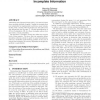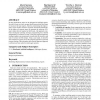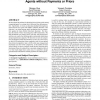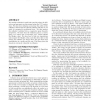103
Voted
ATAL
2010
Springer
15 years 2 months ago
2010
Springer
Alternating-time Temporal Logic (ATL) [1] is used to reason about strategic abilities of agents. Aiming at strategies that can realistically be implemented in software, many varia...
91
Voted
ATAL
2010
Springer
15 years 2 months ago
2010
Springer
In many applications, tasks can be delegated to intelligent agents. In order to carry out a task, an agent should reason about what types of resources the task requires. However, ...
115
Voted
ATAL
2010
Springer
15 years 2 months ago
2010
Springer
We consider the issue of representing coalitional games in multiagent systems that exhibit externalities from coalition formation, i.e., systems in which the gain from forming a c...
118
Voted
ATAL
2010
Springer
15 years 2 months ago
2010
Springer
We consider the problem of allocating networked resources in dynamic environment, such as cloud computing platforms, where providers strategically price resources to maximize thei...
89
Voted
ATAL
2010
Springer
15 years 2 months ago
2010
Springer
Video games provide a rich testbed for artificial intelligence methods. In particular, creating automated opponents that perform well in strategy games is a difficult task. For in...
97
Voted
ATAL
2010
Springer
15 years 2 months ago
2010
Springer
The Restaurant Game demonstrates an end-to-end system that captures and generates social behavior for virtual agents. Over 15,000 people have played The Restaurant Game, and we ha...
131
Voted
ATAL
2010
Springer
2010
Springer
UAV swarm coordination using cooperative control for establishing a wireless communications backbone
15 years 2 months ago
In this paper, we present a mechanism to fly a swarm of UAVs with the aim of establishing a wireless backbone over a pre-specified area. The backbone is aimed at connecting interm...
115
Voted
ATAL
2010
Springer
15 years 2 months ago
2010
Springer
We investigate the problem of allocating items (private goods) among competing agents in a setting that is both prior-free and paymentfree. Specifically, we focus on allocating mu...
117
Voted
ATAL
2010
Springer
15 years 2 months ago
2010
Springer
We consider collusion in multi-unit auctions where the allocation and payments are determined using the VCG mechanism. We show how collusion can increase the utility of the collud...
76
Voted
ATAL
2010
Springer
15 years 2 months ago
2010
Springer




